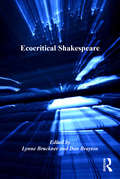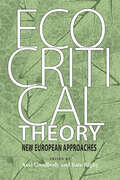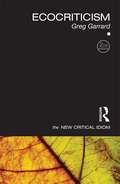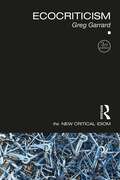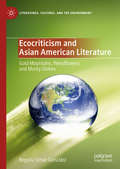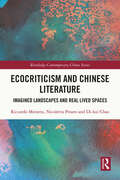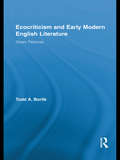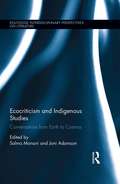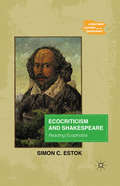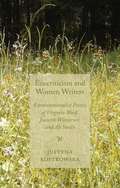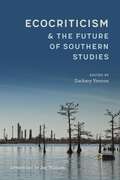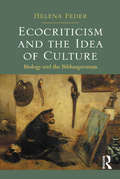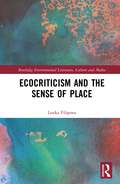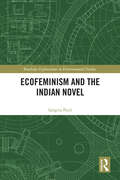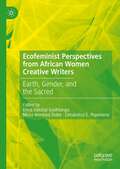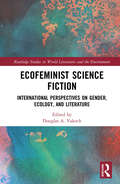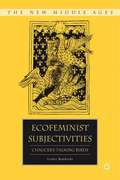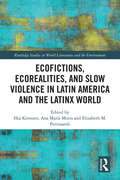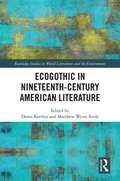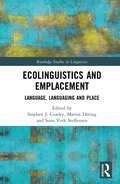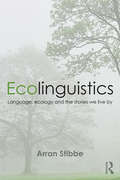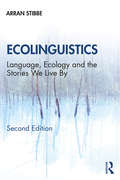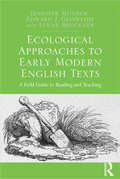- Table View
- List View
Ecocritical Shakespeare: An Ecocritical Exploration (Literary And Scientific Cultures Of Early Modernity Ser.)
by Dan Brayton Lynne BrucknerCan reading, writing about, and teaching Shakespeare contribute to the health of the planet? To what degree are Shakespeare's plays anthropocentric or ecocentric? What is the connection between the literary and the real when it comes to ecological conduct? This collection, engages with these pressing questions surrounding ecocritical Shakespeare, in order to provide a better understanding of where and how ecocritical readings should be situated. The volume combines multiple critical perspectives, juxtaposing historicism and presentism, as well as considering ecofeminism and pedagogy; and addresses such topics as early modern flora and fauna, and the neglected areas of early modern marine ecology and oceanography. Concluding with an assessment of the challenges-and necessities-of teaching Shakespeare ecocritically, Ecocritical Shakespeare not only broadens the implications of ecocriticism in early modern studies, but represents an important contribution to this growing field.
Ecocritical Theory: New European Approaches (Under the Sign of Nature)
by Kate Rigby Axel GoodbodyOne of the more frequently lodged, serious, and justifiable complaints about ecocritical work is that it is insufficiently theorized. Ecocritical Theory puts such claims decisively to rest by offering readers a comprehensive collection of sophisticated but accessible essays that productively investigate the relationship between European theory and ecocritique. With its international roster of contributors and subjects, it also militates against the parochialism of ecocritics who work within the limited canon of the American West. Bringing together approaches and orientations based on the work of European philosophers and cultural theorists, this volume is designed to open new pathways for ecocritical theory and practice in the twenty-first century.
Ecocriticism (The New Critical Idiom)
by Greg GarrardEcocriticismexplores the ways in which we imagine and portray the relationship between humans and the environment in all areas of cultural production, from Wordsworth and Thoreau through to Google Earth, J. M. Coetzee and Werner Herzog's Grizzly Man. Greg Garrard's animated and accessible volume traces the development of the movement and explores its key concepts, including: pollution wilderness apocalypse dwelling animals earth. Featuring a newly rewritten chapter on animal studies, and considering queer and postcolonial ecocriticism and the impact of globalisation, this fully updated second edition also presents a glossary of terms and suggestions for further reading in print and online. Concise, clear, and authoritative, Ecocriticismoffers the ideal introduction to this crucial subject for students of literary and cultural studies.
Ecocriticism (The New Critical Idiom)
by Greg GarrardEcocriticism explores the ways in which we imagine and portray the relationship between humans and the environment across many areas of cultural production, including Romantic poetry, wildlife documentaries, climate models, the Hollywood blockbuster The Day After Tomorrow, and novels by Margaret Atwood, Kim Scott, Barbara Kingsolver and Octavia Butler. Greg Garrard’s animated and accessible volume responds to the diversity of the field today and explores its key concepts, including: • pollution • pastoral • wilderness • apocalypse • animals • Indigeneity • the Earth. Thoroughly revised to reflect the breadth and diversity of twenty-first-century environmental writing and criticism, this edition addresses climate change and justice throughout, and features a new chapter on Indigeneity. It also presents a glossary of terms and suggestions for further reading. Concise, clear and authoritative, Ecocriticism offers the ideal introduction to this crucial subject for students of literary and cultural studies.
Ecocriticism and Asian American Literature: Gold Mountains, Weedflowers and Murky Globes (Literatures, Cultures, and the Environment)
by Begoña Simal-GonzálezEcocriticism and Asian American Literature: Gold Mountains, Weedflowers, and Murky Globes offers an ecocritical reinterpretation of Asian American literature. The book considers more than a century of Asian American writing, from Eaton’s Mrs. Spring Fragrance (1912) to Ozeki's A Tale for the Time Being (2013), through an ecocritical lens. The volume explores the most relevant landmarks in Asian American literature: the first-contact narratives written by Bulosan, Kingston, Mukherjee, and Jen; the controversial texts published by Sui Sin Far (Edith Eaton) at the time of the Yellow Peril; the rise of cultural nationalism in the 1970s and 1980s, illustrated by Wong’s Homebase and Kingston’s China Men; old and recent examples of “internment literature” dealing with the incarceration of Japanese Americans during WWII (Sone, Houston, Miyake, Kadohata); and the new trends in Asian American literature since the 1990s, exemplified by Yamashita’s and Ozeki’s novels, which explore the challenges of our transnational, transnatural era. Begoña Simal-González’s ecocritical readings of these texts provide crucial interdisciplinary insights, addressing and analyzing important narratives within Asian American culture and literature.
Ecocriticism and Chinese Literature: Imagined Landscapes and Real Lived Spaces (Routledge Contemporary China Series)
by Riccardo MorattoFocusing on ecocritical aspects throughout Chinese literature, particularly modern and contemporary Chinese literature, the contributors to this book examine the environmental and ecological dimensions of notions such as qing (情) and jing (境). Chinese modern and contemporary environmental writing offers a unique aesthetic perspective toward the natural world. Such a perspective is mainly ecological and allows human subjects to take a benign and nonutilitarian attitude toward nature. The contributors to this book demonstrate how Chinese literary ecology tends toward an ecological-systemic holism from which all human behaviors should be closely examined. They do so by examining a range of writers and genres, including Liu Cixin’s science fiction, Wu Ming-yi’s environmental fiction, and Zhang Chengzhi’s historical narratives. This book provides valuable insights for scholars and students looking to understand how Chinese literature conceptualizes the relationship between humanity and nature, as well as our role and position within the natural realm.
Ecocriticism and Early Modern English Literature: Green Pastures (Routledge Studies In Renaissance Literature And Culture Ser. #16)
by Todd A. BorlikIn this timely new study, Borlik reveals the surprisingly rich potential for the emergent "green" criticism to yield fresh insights into early modern English literature. Deftly avoiding the anachronistic casting of sixteenth- and seventeenth-century authors as modern environmentalists, he argues that environmental issues, such as nature’s personhood, deforestation, energy use, air quality, climate change, and animal sentience, are formative concerns in many early modern texts. The readings infuse a new urgency in familiar works by Shakespeare, Sidney, Spenser, Marlowe, Ralegh, Jonson, Donne, and Milton. At the same time, the book forecasts how ecocriticism will bolster the reputation of less canonical authors like Drayton, Wroth, Bruno, Gascoigne, and Cavendish. Its chapters trace provocative affinities between topics such as Pythagorean ecology and the Gaia hypothesis, Ovidian tropes and green phenomenology, the disenchantment of Nature and the Little Ice Age, and early modern pastoral poetry and modern environmental ethics. It also examines the ecological onus of Renaissance poetics, while showcasing how the Elizabethans’ sense of a sophisticated interplay between nature and art can provide a precedent for ecocriticism’s current understanding of the relationship between nature and culture as "mutually constructive." Situating plays and poems alongside an eclectic array of secondary sources, including herbals, forestry laws, husbandry manuals, almanacs, and philosophical treatises on politics and ethics, Borlik demonstrates that Elizabethan and Jacobean authors were very much aware of, and concerned about, the impact of human beings on their natural surroundings.
Ecocriticism and Indigenous Studies: Conversations from Earth to Cosmos (Routledge Interdisciplinary Perspectives on Literature)
by Joni Adamson Salma MonaniThis book addresses the intersections between the interdisciplinary realms of Ecocriticism and Indigenous and Native American Studies, and between academic theory and pragmatic eco-activism conducted by multiethnic and indigenous communities. It illuminates the multi-layered, polyvocal ways in which artistic expressions render ecological connections, drawing on scholars working in collaboration with Indigenous artists from all walks of life, including film, literature, performance, and other forms of multimedia to expand existing conversations. Both local and global in its focus, the volume includes essays from multiethnic and Indigenous communities across the world, visiting topics such as Navajo opera, Sami film production history, south Indian tribal documentary, Maori art installations, Native American and First Nations science-fiction literature and film, Amazonian poetry, and many others. Highlighting trans-Indigenous sensibilities that speak to worldwide crises of environmental politics and action against marginalization, the collection alerts readers to movements of community resilience and resistance, cosmological thinking about inter- and intra-generational multi-species relations, and understandings of indigenous aesthetics and material ecologies. It engages with emerging environmental concepts such as multispecies ethnography, cosmopolitics, and trans-indigeneity, as well as with new areas of ecocritical research such as material ecocriticism, biosemiotics, and media studies. In its breadth and scope, this book promises new directions for ecocritical thought and environmental humanities practice, providing thought-provoking insight into what it means to be human in a locally situated, globally networked, and cosmologically complex world.
Ecocriticism and Shakespeare
by Simon C. EstokThis book offers the term 'ecophobia' as a way of understanding and organizing representations of contempt for the natural world. Estok argues that this vocabulary is both necessary to the developing area of ecocritical studies and for our understandings of the representations of 'Nature' in Shakespeare.
Ecocriticism and Women Writer
by Justyna KostkowskaVirginia Woolf, Jeanette Winterson, and Ali Smith share an ecological philosophy of the world as one highly interconnected entity comprised of multiple and equal, human and non-human participants. This study argues that these writers' ecocentric views find expression through their literary forms and that their texts have an ecological significance in fostering respect for and understanding of difference, human and nonhuman. Beginning with Woolf's work, these writers abandon the hegemonic master narrative and instead practice pluralistic, democratic, and non-authoritarian forms that are consistent with feminist ecology and erode patriarchal domination. Their texts have a world-transforming potential as they offer formal models that overcome dualistic thinking and unsettle traditional binaries. The value transformation they encourage is an indispensible groundwork for the new environmental philosophy and a prerequisite to progressive action and change.
Ecocriticism and the Future of Southern Studies
by Lisa Hinrichsen Christopher Lloyd Joseph Thompson John Moran Scott Romine Jay Watson Robert Azzarello Evangelia Kindinger Delia Byrnes Sam Horrocks Sarah McFarland Joshua Myers Scott Obernesser Lucas Sheaffer Jimmy Dean Smith Daniel Spoth Ila Tyagi Jonathan VillalobosAs the planet faces ever-worsening disruptions to global ecosystems—carbon and chemical emissions, depletions of the ozone layer, the loss of biodiversity, rising sea levels, air toxification, and worsening floods and droughts—scholars across academia must examine the cultural effects of this increasingly postnatural world. That task proves especially vital for southern studies, given how often the U.S. South serves as a site for large-scale damming initiatives like the TVA, disasters on the scale of Hurricane Katrina and the Deepwater Horizon spill, and the extraction of coal, oil, and natural gas. Ecocriticism and the Future of Southern Studies is the first book-length collection of scholarship that applies interdisciplinary environmental humanities research to cultural analyses of the U.S. South. Sixteen essays examine novels, nature writing, films, television, and music that address a broad range of ecological topics related to the region, including climate change, manmade and natural environments, the petroleum industry, food cultures, waterways, natural and human-induced disasters, waste management, and the Anthropocene. Edited by Zackary Vernon, this volume demonstrates how the greening of southern studies, in tandem with the southernization of environmental studies, can catalyze alternative ways of understanding the connections between regional and global cultures and landscapes. By addressing ecological issues central to life throughout the South, Ecocriticism and the Future of Southern Studies considers the confluence between region and environment, while also illustrating the growing need to see environmental issues as matters of social justice.
Ecocriticism and the Idea of Culture: Biology and the Bildungsroman
by Helena FederEcocriticism and the Idea of Culture: Biology and the Bildungsroman draws on work by Kinji Imanishi, Frans de Waal, and other biologists to create an interdisciplinary, materialist notion of culture for ecocritical analysis. In this timely intervention, Feder examines the humanist idea of culture by taking a fresh look at the stories it explicitly tells about itself. These stories fall into the genre of the Bildungsroman, the tale of individual acculturation that participates in the myth of its complete separation from and opposition to nature which, Feder argues, is culture’s own origin story. Moving from Voltaire’s Candide to Mary Shelley’s Frankenstein and from Virginia Woolf’s Orlando to Jamaica Kincaid’s Lucy, the book dramatizes humanism’s own awareness of the fallacy of this foundational binary. In the final chapters, Feder examines the discourse of animality at work in this narrative as a humanist fantasy about empathy, one that paradoxically excludes other animals from the ethical community to justify the continued domination of both human and nonhuman others.
Ecocriticism and the Sense of Place (Routledge Environmental Literature, Culture and Media)
by Lenka FilipovaThe book is an investigation into the ways in which ideas of place are negotiated, contested and refigured in environmental writing at the turn of the twenty-first century. It focuses on the notion of place as a way of interrogating the socio-political and environmental pressures that have been seen as negatively affecting our environments since the advent of modernity, as well as the solutions that have been given as an antidote to those pressures. Examining a selection of literary representations of place from across the globe, the book illuminates the multilayered and polyvocal ways in which literary works render local and global ecological relations of places. In this way, it problematises more traditional environmentalism and its somewhat essentialised idea of place by intersecting the largely Western discourse of environmental studies with postcolonial and Indigenous studies, thus considering the ways in which forms of emplacement can occur within displacement and dispossession, especially within societies that are dealing with the legacies of colonialism, neocolonial exploitation or international pressure to conform. As such, the work foregrounds the singular processes in which different local/global communities recognise themselves in their diverse approaches to the environment, and gestures towards an environmental politics that is based on an epistemology of contact, connection and difference, and as one, moreover, that recognises its own epistemological limits. This book will appeal to researchers working in the fields of environmental humanities, postcolonial studies, Indigenous studies and comparative literature.
Ecocriticism in the Modernist Imagination
by Kelly SultzbachAlthough modernism has traditionally been considered an art of cities, Ecocriticism in the Modernist Imagination claims a significant role for modernist texts in shaping environmental consciousness. Analyzing both canonical and lesser-known works of three key figures - E. M. Forster, Virginia Woolf, and W. H. Auden - Sultzbach suggests how the signal techniques of modernism encourage readers to become more responsive to the animate world and non-human minds. Understanding the way these writers represent nature's agency becomes central to interpreting the power dynamics of empire and gender, as well as experiments with language and creativity. The book acknowledges the longer pastoral tradition in literature, but also introduces readers to the newly expanding field of ecocriticism, including philosophies of embodiment and matter, queer ecocriticism, and animal studies. What emerges is a picture of green modernism that reifies our burgeoning awareness of what it means to be human within a larger living community.
Ecofeminism and the Indian Novel (Routledge Explorations in Environmental Studies)
by Sangita PatilEcofeminism and the Indian Novel tests the theories of ecofeminism against the background of India’s often different perceptions of environmental problems, challenging the hegemony of Western culture in thinking about human problems. This book moves beyond a simple application of the concepts of ecofeminism, instead explaining the uniqueness of Indian novels as narratives of ecofeminism and how they can contribute to the development of the theory of ecofeminism. In examining a selection of novels, the author argues that Indian texts conceptualize the ecological crisis more as a human problem than as a gender problem. The book proposes that we should think of ecofeminism as ecohumanism instead, seeing human beings and nature as a part of a complex web. Novels analysed within the text include Kamala Markandaya’s Nectar in a Sieve (1954), Shivram Karanth’s Return to Earth (2002) and Na D’Souza’s Dweepa (2013). Ecofeminism and the Indian Novel will be of great interest to students and scholars of ecofeminism, ecocriticism, ecological feminism, environmental humanities, gender studies, ecological humanities, feminist studies and Indian literature.
Ecofeminist Approaches to Early Modernity
by Jennifer Munroe Rebecca LarocheChallenges the notion of how early modern women may or may not have spoken for (or even with) nature. By focusing on various forms of 'dialogue,' these essays shift our interest away from speaking and toward listening, to illuminate ways that early modern Englishwomen interacted with their natural surroundings.
Ecofeminist Perspectives from African Women Creative Writers: Earth, Gender, and the Sacred
by Enna Sukutai Gudhlanga Musa Wenkosi Dube Limakatso E. PepeneneThis volume explores contemporary African women’s creative writing, highlighting their contributions to ecofeminist theology. Contributors address the following questions: How do contemporary African women writers depict the Earth/land/environment and its relationship to women in various contexts? How is religion featured in African women’s writing? How does religious literature (scriptures) form an intertextual layer in African women’s writing? The contributors proceed by analyzing the intersection of religion, gender, class, sexuality, colonialism, and ecology in selected texts written by African women. They bring these texts into conversation with broader eco-feminist theological scholarship, exploring the potential of literary writing to contribute to theological discourse of liberation and social justice in the African and global arena.
Ecofeminist Science Fiction: International Perspectives on Gender, Ecology, and Literature (Routledge Studies in World Literatures and the Environment)
by Douglas A. VakochEcofeminist Science Fiction: International Perspectives on Gender, Ecology, and Literature provides guidance in navigating some of the most pressing dangers we face today. Science fiction helps us face problems that threaten the very existence of humankind by giving us the emotional distance to see our current situation from afar, separated in our imaginations through time, space, or circumstance. Extrapolating from contemporary science, science fiction allows a critique of modern society, imagining more life-affirming alternatives. In this collection, ecocritics from five continents scrutinize science fiction for insights into the fundamental changes we need to make to survive and thrive as a species. Contributors examine ecofeminist themes in films, such as Avatar, Star Wars, and The Stepford Wives, as well as television series including Doctor Who and Westworld. Other scholars explore an internationally diverse group of both canonical and lesser-known science fiction writers including Oreet Ashery, Iraj Fazel Bakhsheshi, Liu Cixin, Louise Erdrich, Hanns Heinz Ewers, Larissa Lai, Ursula K. Le Guin, Chen Qiufan, Mary Doria Russell, Larissa Sansour, Karen Traviss, and Jeanette Winterson. Ecofeminist Science Fiction explores the origins of human-caused environmental change in the twin oppressions of women and of nature, driven by patriarchal power and ideologies. Female embodiment is examined through diverse natural and artificial forms, and queer ecologies challenge heteronormativity. The links between war and environmental destruction are analyzed, and the capitalist motivations and means for exploiting nature are critiqued through postcolonial perspectives.
Ecofeminist Subjectivities
by Lesley KordeckiThis bookanalyzes theinteraction between gender and species in Chaucer's poetry and strives to understand his adaptation of medieval discourse through an ecofeminist lens. Works that either speak of animals, or more pertinently those with animals speaking, offer fruitful results in the attempt to understand the medieval textual handling of the 'others' of society. "
Ecofictions, Ecorealities and Slow Violence in Latin America and the Latinx World (Routledge Studies in World Literatures and the Environment)
by Ilka Kressner Ana María Mutis Elizabeth M. PettinaroliEcofictions, Ecorealities and Slow Violence in Latin America and the Latinx World brings together critical studies of Latin American and Latinx writing, film, visual, and performing arts to offer new perspectives on ecological violence. Building on Rob Nixon’s concept of "slow violence," the contributions to the volume explore processes of environmental destruction that are not immediately visible yet expand in time and space and transcend the limits of our experience. Authors consider these forms of destruction in relation to new material contexts of artistic creation, practices of activism, and cultural production in Latin American and Latinx worlds. Their critical contributions investigate how writers, cultural activists, filmmakers, and visual and performance artists across the region conceptualize, visualize, and document this invisible but far-reaching realm of violence that so tenaciously resists representation. The volume highlights the dense web of material relations in which all is enmeshed, and calls attention to a notion of agency that transcends the anthropocentric, engaging a cognition envisioned as embodied, collective, and relational. Ecofictions, Ecorealities and Slow Violence measures the breadth of creative imaginings and critical strategies from Latin America and Latinx contexts to enrich contemporary ecocritical studies in an era of heightened environmental vulnerability.
Ecogothic in Nineteenth-Century American Literature (Routledge Studies in World Literatures and the Environment)
by Dawn Keetley Matthew Wynn SivilsFirst Published in 2017. Routledge is an imprint of Taylor & Francis, an Informa company.
Ecolinguistics and Emplacement: Language, Languaging and Place (Routledge Studies in Linguistics)
by Martin Döring Stephen J. Cowley Sune Vork SteffensenThis edited volume contributes to recent theoretical work in ecolinguistics that treats language as, not about nature, but of nature.Through a dialogical interplay of theoretical and empirical work, the chapters apply ecological concepts of language, languaging, and emplacement to a multiplicity of issues, settings, and place-worlds. Empirically, the chapters meander through a universe of chimpanzees engaged in problem solving, children playing marbles, political constitutions, agricultural dictionaries, Sicilian nature reserves, children’s experiences of devastating outbreaks of foot and mouth disease, expressions of sorrow across closed borders, and the linguistic conquest of uninhabited islands. By attending to locale, sense of place, and location across this diversity, the volume evokes new empirical, methodological, and practical horizons that allow ecolinguists to ask how people and their emplacement are affected by language and languaging, and how the effects of practices impact on, not just human lifeworlds, but also trillions of bioecologies.This book will be of interest to students and scholars interested in ecolinguistics, discourse analysis, applied linguistics, language contact, environmental humanities, and human and social geography.
Ecolinguistics: Language, Ecology and the Stories We Live By
by Arran StibbeThe increasingly rapid destruction of the ecological systems that support life is calling into question some of the fundamental stories that we live by: stories of unlimited economic growth, of consumerism, progress, individualism, success, and the human domination of nature. Ecolinguistics shows how linguistic analysis can help reveal the stories we live by, open them up to question, and contribute to the search for new stories. Bringing together the latest ecolinguistic studies with new theoretical insights and practical analyses, this book charts a new course for ecolinguistics as an engaged form of critical enquiry. Featuring: A framework for understanding the theory of ecolinguistics and applying it practically in real life; Exploration of diverse topics from consumerism in lifestyle magazines to Japanese nature haiku; A comprehensive glossary giving concise descriptions of the linguistic terms used in the book; Discourse analysis of a wide range of texts including newspapers, magazines, advertisements, films, nonfiction books, and visual images. This is essential reading for undergraduates, postgraduates and researchers working in the areas of Discourse Analysis and Language and Ecology.
Ecolinguistics: Language, Ecology and the Stories We Live By (Bloomsbury Advances In Ecolinguistics Ser.)
by Arran StibbeEcolinguistics: Language, Ecology and the Stories We Live By is a ground-breaking book which reveals the stories that underpin unequal and unsustainable societies and searches for inspirational forms of language that can help rebuild a kinder, more ecological world. This new edition has been updated and expanded to bring together the latest ecolinguistic studies with new theoretical insights and practical analyses. The book presents a theoretical framework and practical tools for analysing the key texts which shape the society we live in. The theory is illustrated through examples, including the representation of environmental refugees in the media; the construction of the selfish consumer in economics textbooks; the parallels between climate change denial and coronavirus denial; the erasure of nature in the Sustainable Development Goals; creation myths and how they orient people towards the natural world; and inspirational forms of language in nature writing, Japanese haiku and Native American writing. This edition provides an updated theoretical framework, new example analyses, and an additional chapter on narratives. Accompanied by a free online course with videos, PowerPoints, notes and exercises (www.storiesweliveby.org.uk), as well as a comprehensive glossary, this is essential reading for undergraduates, postgraduates and researchers working in the areas of Discourse Analysis, Environmental Studies and Communication Studies.
Ecological Approaches to Early Modern English Texts: A Field Guide to Reading and Teaching
by Jennifer Munroe Edward J. GeisweidtEcocriticism has steadily gained footing within the larger arena of early modern scholarship, and with the publication of well over a dozen monographs, essay collections, and special journal issues, literary studies looks increasingly ’green’; yet the field lacks a straightforward, easy-to-use guide to do with reading and teaching early modern texts ecocritically. Accessible yet comprehensive, the cutting-edge collection Ecological Approaches to Early Modern English Texts fills this gap. Organized around the notion of contact zones (or points of intersection, that have often been constructed asymmetrically-especially with regard to the human-nonhuman dichotomy), the volume reassesses current trends in ecocriticism and the Renaissance; introduces analyses of neglected texts and authors; brings ecocriticism into conversation with cognate fields and approaches (e.g., queer theory, feminism, post-coloniality, food studies); and offers a significant section on pedagogy, ecocriticism and early modern literature. Engaging points of tension and central interest in the field, the collection is largely situated in the 'and/or' that resides between presentism-historicism, materiality-literary, somatic-semiotic, nature-culture, and, most importantly, human-nonhuman. Ecological Approaches to Early Modern English Texts balances coverage and methodology; its primary goal is to provide useful, yet nuanced discussions of ecological approaches to reading and teaching a range of representative early modern texts. As a whole, the volume includes a diverse selection of chapters that engage the complex issues that arise when reading and teaching early modern texts from a green perspective.
